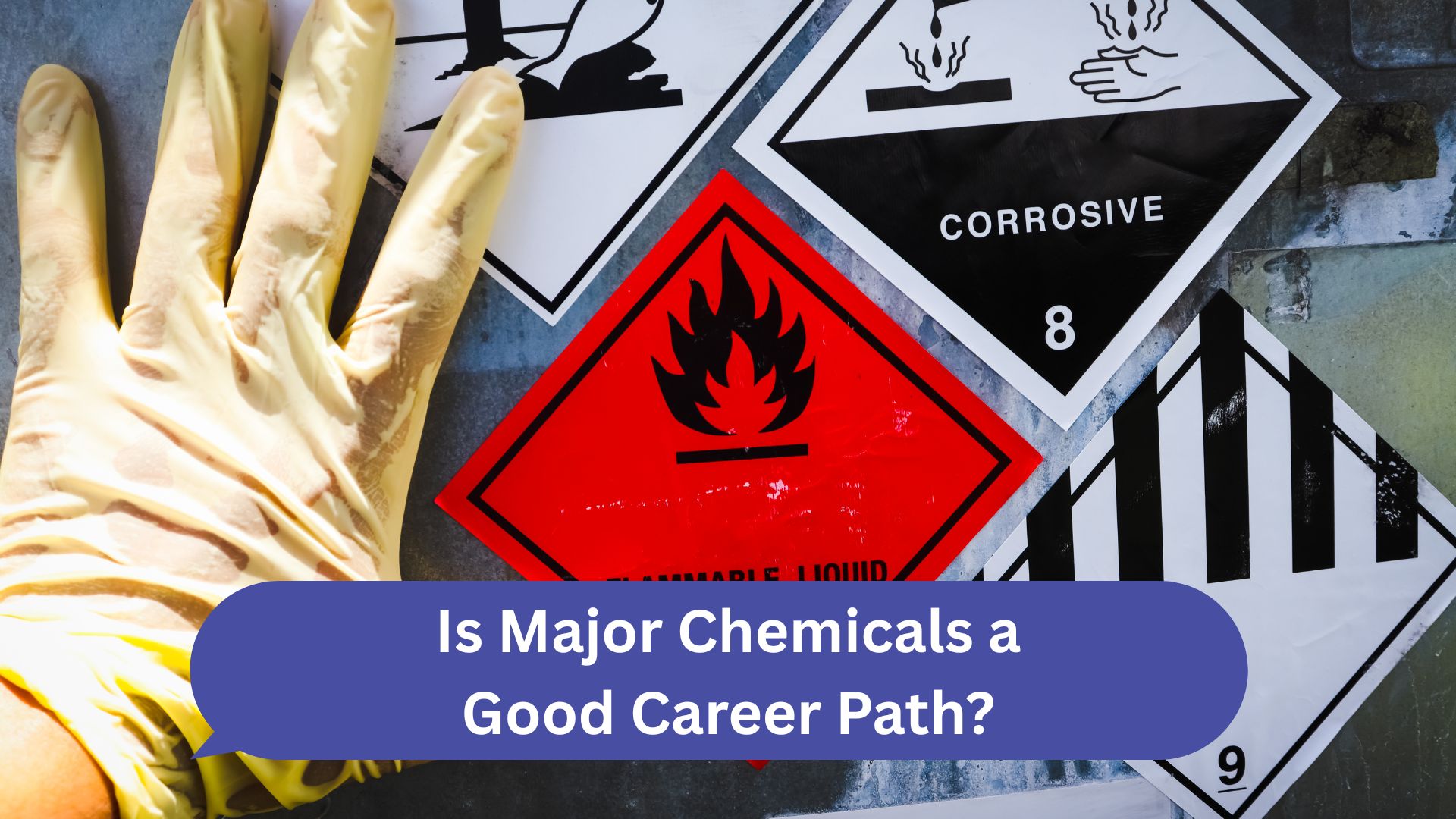Is Major Chemicals a Good Career Path for you?
If you’re fascinated by formulas, intrigued by innovation, and want to work in a field that powers everything from energy to agriculture, major chemicals might just be your calling.
But is it a good career path?
Let’s break down what working in this sector means—opportunities, challenges, salaries, and the kind of person who thrives in it.
What Are Major Chemicals?
Major chemicals refer to large-scale chemical products and processes that are central to many industries. Think industrial chemicals, petrochemicals, polymers, agricultural chemicals, and even pharmaceuticals.
Companies in this space include giants like:
- BASF
- Dow
- DuPont
- LyondellBasell
This sector plays a crucial role in creating products that power our everyday lives—plastics, fertilizers, paints, textiles, batteries, and medicines.
And because it’s so deeply embedded in global manufacturing, the career possibilities are vast.
Why Choose a Career in Major Chemicals?

The major chemicals industry is more than just beakers and formulas—it’s a powerhouse of innovation, sustainability, and global impact. Here’s why a career in this field can be a smart, rewarding move:
1. Diverse Opportunities Across Industries
A career in chemicals isn’t confined to laboratories. Professionals work in pharmaceuticals, agriculture, energy, food production, cosmetics, automotive, and even tech. Whether you’re interested in R&D, operations, marketing, or logistics, there’s a place for you in this wide-ranging field.
2. High Earning Potential
Many roles, especially those requiring STEM degrees like chemical engineering or materials science, offer competitive salaries right from the start. With experience, professionals in management, sales engineering, and regulatory affairs can earn six figures or more.
3. Job Stability & Demand
Chemical products are vital to countless industries and everyday life. From water purification systems to medication and packaging materials, demand for chemical innovation and production remains strong—even during economic downturns. That makes this field relatively recession-resilient.
4. Innovation & Problem-Solving
This is an ideal field for curious minds. You’ll often be tasked with creating more efficient, sustainable, or cost-effective processes and products. From developing eco-friendly plastics to improving battery technology, there’s always something new to solve.
5. Global Career Path
Major chemical companies operate internationally, which opens up global mobility. With the right experience and certifications, you could work on projects across Europe, the U.S., Asia, or the Middle East.
6. Sustainability & Green Chemistry
The industry is rapidly evolving to prioritize sustainability. Green chemistry, carbon capture, and renewable energy applications are growing fast. If you’re passionate about making an environmental impact, this field offers real opportunities to lead the change.
7. Clear Advancement Path
Most chemical companies have well-defined paths for career growth. With a few years of experience, professionals can move into senior technical roles, project management, or leadership positions, often supported by internal training or sponsorships for further education.
8. Interdisciplinary Work
A career in chemicals allows you to collaborate with experts in engineering, logistics, finance, data science, and law. It’s a great choice if you enjoy working in dynamic, cross-functional teams.
Common Careers in the Major Chemicals Industry

1. Chemical Engineer
Chemical engineers design and improve large-scale manufacturing processes. They focus on turning raw materials into valuable products like plastics, fuels, and fertilizers—while optimizing efficiency and ensuring safety.
2. Process Technician
These technicians operate and monitor machinery in chemical plants. They ensure everything runs smoothly, troubleshoot issues, and help maintain consistent production quality.
3. Quality Control Analyst
This role involves testing chemical products to ensure they meet regulatory and internal quality standards. QC analysts often work in labs and are key in minimizing defects and safety risks.
4. Environmental Health & Safety (EHS) Specialist
EHS professionals make sure chemical operations follow safety and environmental laws. They manage risk assessments, emergency protocols, and the safe handling of hazardous materials.
5. Research Scientist
Working in R&D labs, research scientists develop new chemical compounds, improve product formulas, and test sustainable alternatives. Many have advanced degrees in chemistry or related fields.
6. Regulatory Affairs Specialist
This job involves navigating complex regulations around chemicals. These professionals handle permits, ensure product documentation meets standards, and work closely with compliance and legal teams.
7. Sales Engineer (Chemical Products)
Sales engineers combine technical know-how with sales skills to offer tailored chemical solutions to businesses. They often work closely with manufacturing and client companies to understand needs and recommend products.
8. Materials Scientist
Materials scientists explore the properties and applications of new and existing materials. They develop stronger, more efficient electronics, aerospace, and construction substances.
9. Supply Chain Manager
This person oversees the entire journey of chemical products—from raw material sourcing to final delivery. They optimize logistics, manage vendors, and ensure timely and cost-effective production.
10. Laboratory Technician
Lab techs assist chemists and researchers with experiments. They prep equipment, handle samples, log data, and help ensure that lab procedures run smoothly and accurately.
What Qualifications do you Need for a Career in Major Chemicals?

Breaking into the major chemicals industry typically requires a strong academic background, technical expertise, and in many cases, hands-on experience.
While qualifications vary depending on the specific role, here’s a closer look at what you’ll generally need:
Educational Background
Most careers in this field begin with a degree in a science, technology, engineering, or math (STEM) discipline. Common majors include:
-
Chemical Engineering – Often considered the gold standard for technical roles. This degree opens doors to process engineering, plant operations, and product development.
-
Chemistry – Ideal for roles in research, formulation, quality control, or analytical testing.
-
Materials Science – Useful for developing new compounds, coatings, plastics, and composites.
-
Environmental Science or Engineering – Relevant for sustainability, waste management, and green chemistry positions.
-
Pharmaceutical Sciences or Biochemistry – Essential for roles in chemical production for medical or biotech industries.
For leadership roles or highly specialized positions, a Master’s or PhD may be necessary, particularly in research and development (R&D).
Industry Certifications (Optional but Beneficial)
Certifications can help candidates stand out or transition into more specific niches:
-
Certified Chemical Engineer (ChE) – Validates technical competency for engineers.
-
OSHA Safety Certification – Important for compliance and safety roles in chemical plants.
-
Lean Six Sigma Certification – Useful in production, quality control, and process improvement.
-
Hazardous Waste Operations (HAZWOPER) – Required for professionals handling or transporting hazardous materials.
-
Project Management Professional (PMP) – Recommended for team leads, project engineers, or anyone managing complex chemical projects.
Technical Skills
Practical, job-specific skills are highly valued and often required:
-
Lab and Analytical Techniques – For R&D or quality assurance positions.
-
Chemical Process Simulation Software (e.g., Aspen Plus, ChemCAD) – Used by process and systems engineers.
-
Understanding of Good Manufacturing Practices (GMP) – Especially important in pharmaceutical and food-grade chemical production.
-
Familiarity with Environmental and Safety Regulations – Including REACH, EPA guidelines, and ISO standards.
Soft Skills That Matter
While technical qualifications are essential, the following soft skills are also critical to thrive in the chemical industry:
-
-
Problem-solving – Whether troubleshooting a faulty reaction or improving production yields, analytical thinking is vital.
-
Communication – You’ll often present findings, train staff, or collaborate across departments and countries.
-
Attention to Detail – Mistakes in chemical formulas, safety checks, or compliance reporting can have serious consequences.
-
Adaptability – The industry is fast-changing, especially with evolving technologies and environmental standards.
-
How to Get Started with Major Chemicals?

-
Choose a Specialized Degree – Look for programs with strong chemical engineering, biochemistry, or materials science tracks.
-
Internships – Secure internships at chemical companies to gain hands-on experience and build a network. This is the best way to secure your first job in your field.
-
Get Licensed (if needed) – For certain roles like chemical engineering, you may need a PE license.
-
Stay Updated – This industry evolves fast. Subscribe to chemical journals or join professional associations like AIChE or ACS.
Who Is a Career in Major Chemicals For?
A career in major chemicals isn’t for everyone—but for the right person, it can be rewarding, challenging, and full of long-term growth opportunities. So, who tends to thrive in this field?
1. Science and Engineering Enthusiasts
If you enjoy chemistry, physics, or math—and love seeing how scientific principles apply to the real world—you’ll find the major chemicals industry both intellectually stimulating and practical.
2. Problem-solvers and Critical Thinkers
This field often involves troubleshooting complex systems, optimizing chemical reactions, and improving efficiency. If you’re someone who enjoys thinking analytically and solving real-world problems, you’ll feel right at home.
3. Detail-Oriented Professionals
Precision is everything in chemistry. Whether you’re handling raw materials, working in R&D, or ensuring regulatory compliance, being detail-oriented can make or break your success.
4. Safety-Conscious Individuals
If you take safety seriously and can consistently follow protocols and best practices, you’ll thrive in this risk-sensitive environment where safety is top priority.
5. People Comfortable with Structure
This industry is built on strict procedures, regulatory guidelines, and consistent documentation. If you like working within a well-defined framework and understand the importance of standards, this could be a great fit.
Final Verdict: Is Major Chemicals a Good Career Path for you?
Absolutely—if you’re passionate about science, enjoy technical problem-solving, and want to be part of a critical, future-facing industry.
From innovation to impact, the chemical sector offers strong pay, stability, and variety for those ready to dive into the molecular world.
If interested, there are more similar articles for choosing your career path:




